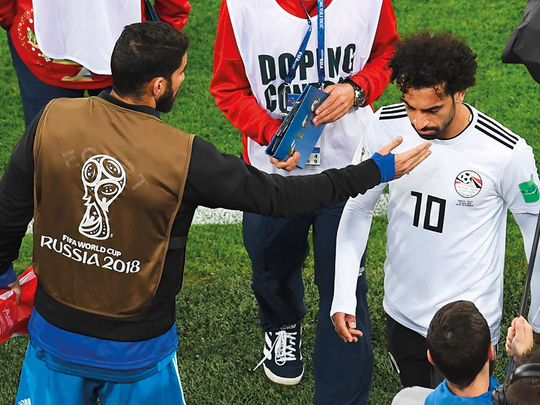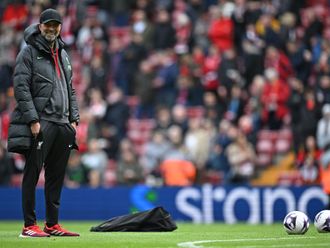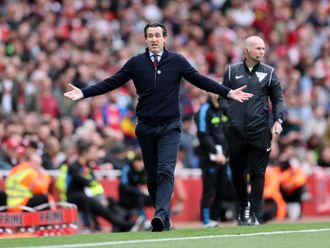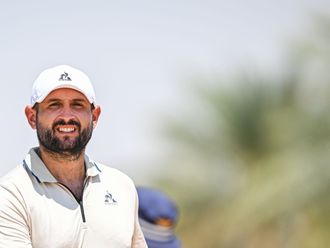
St Petersburg: They made the kind of swarming, swirling noise that goes into the ears and commandeers the body and starts sowing the goose bumps, the kind of noise that helps make sports irresistible to those afflicted with them, the kind of noise unattainable elsewhere. They made this noise 30 minutes before kick-off, ringing the stadium as an enormous, electric contingent that could make you feel the bigness of Egypt and its 97 million, until it seemed a whole chunk of Egypt might have dislodged and made it all the way up to Russia.
What’s lousy, then, is that somehow, this World Cup will always ache for the noise they did not make.
They never did get a chance at that boom the ears craved, the one that would have come had these eager fans beheld a World Cup goal by their global star, the beloved Mohammad Salah, at some juncture other than at a 3-0 deficit, which happened to be when he did score (from a penalty) on Tuesday night, in his first game back from arduous shoulder rehabilitation. So when they filed out from a 3-1 loss to Russia that effectively snuffed Egypt’s chances of reaching the knockout stage, in their flag capes and their pharaoh hats and all else, a heartfelt summary came from a US-based Egyptian.
“You have no idea,” Mohannad Gomaa said. “It hurts. It does hurt.”
Egyptians know that sport can dole out the din, it also can dish out the meanness, for it just went and threw a whole heap of the latter upon Egypt. Egypt had reached the World Cup finals for the first time in 28 years. Older adults revelled in another chance at the spectacle at last while young adults revelled in seeing what it all meant. It felt so heady and, as Gomaa described, it had that dimension that somehow, with people being curious beings, makes the thing even more appealing: the presence of a global star, the player of the year in the English Premier League, Salah, aimed towards a first World Cup.
Then on May 26 in the European Champions League final in Kiev, Salah of Liverpool and Sergio Ramos of Real Madrid tumbled to the pitch together, and Salah, 26, tumbled upon his shoulder, and blame started tumbling everywhere but mostly toward Ramos, and Liverpool manager Jurgen Klopp called it “very bad for Mo Salah, for us and for Egypt”.
“It was a nightmare,” said Emr Shousha, a 28-year-old Cairo resident.
“We hated it at the final game of the Champions League,” said Ayman Shaadan, a 35-year-old Cairo resident. “We were very upset in Egypt with what happened.”
They said these things beforehand Tuesday night, as they made their way to their seats, as they still walked around with a vibrant and rational hope. In a Group A considered more toothless than other groups, they had lost their opener to Uruguay by 1-0 on an agonising 89th-minute goal as Salah sat on the bench. Now, Salah would return, and if Egypt could squeeze by Russia and then Saudi Arabia after that, they could walk the tightrope from uncertainty to the knockout round.
Salah did appear at least slightly diminished, maybe short of the form that would have come from training for three solid weeks with the national team rather than training alone. He often remained up the pitch early on while Egypt’s defence tried to deal with Russia’s parries. He did wring a big gasp in the 42nd minute when he got a mild chance in the box and wheeled around and sent one just left of the post.
That meant the score stayed scoreless until Ahmad Fathi put the ball into his own net.
That meant that in their five days of the World Cup, Egypt fans had missed Salah and witnessed both an 89th-minute goal and an own goal. Mean.
Russia would get two lovely goals within 15 minutes after that and the home crowd would have itself a loud time even as Salah would get his penalty at 73 minutes, but the whole big thing had just deflated and sagged. Egypt didn’t get back into this just to have manager Hector Cuper say, “Certainly we will try to finish this World Cup in the best possible manner.”
He said: “We all know what Mo Salah means for the national team. He’s a crucial, vital player. He’s a point of reference. He’s given the team great satisfaction. We would have all preferred his injury not to have occurred. But that’s the way it is and we go on from there.”
Now somehow, all that remain are a match with Saudi Arabia and then some memories, such as “being here and feeling the festivities”, Gomaa said, “and seeing Egyptians from all across the world,” plus “just a joy people have in Egypt about the participation”.
They had sung their national anthem stirringly. They had roared when Salah’s face appeared on the big screen during warm-ups. They had roared at his name during the quick public-address listing of the starting line-ups.
What it might have been to hear those roars even magnified.












